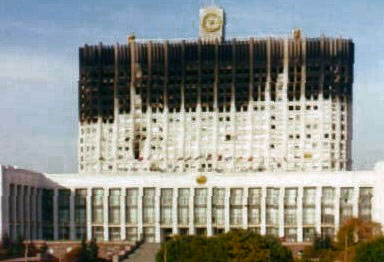Summary | Excerpt | Reviews | Beyond the Book | Read-Alikes | Genres & Themes | Author Bio

A Memoir
by Alexei NavalnyThis article relates to Patriot
 Patriot by Alexei Navalny covers the Russian opposition leader's life from his childhood in the USSR in the 1980s to his final days in an Arctic penal colony in 2024. One important moment in the development of his political consciousness that he outlines in his memoir is the 1993 Russian constitutional crisis, an event which eventually became known as the "October Coup."
Patriot by Alexei Navalny covers the Russian opposition leader's life from his childhood in the USSR in the 1980s to his final days in an Arctic penal colony in 2024. One important moment in the development of his political consciousness that he outlines in his memoir is the 1993 Russian constitutional crisis, an event which eventually became known as the "October Coup."
In 1993, Russian democracy was two years old. Boris Yeltsin, a former Communist Party functionary, had been chosen in 1991 as the Russian Federation's first democratically-elected president on a wave of popular support. Having restyled himself as a reformer, he embarked on economic "shock therapy"—the rapid implementation of market forces on the Soviet planned economy—as a way to accelerate the transition to a free-market society.
The shock therapy quickly proved disastrous. Hyperinflation left many Russians destitute; by 1994, prices would rise to nearly 2,000 times their 1990 baseline. The rapid privatization of industry also greatly favored the few men who had made their fortunes in the final years of the Soviet Union, ushering in the first generation of oligarchs. Opposition to the economic reforms grew, eventually coalescing around the head of Russia's parliament, Ruslan Khasbulatov, and Yeltsin's own Vice President, Alexander Rutskoy. From the Russian legislature, these two men stymied all efforts by the executive to continue the reforms. By autumn of 1993, the country was in a constitutional crisis.
The constitution of the Russian Federation—which was, in fact, the Soviet constitution dating from 1978—allowed for no way to break the deadlock between legislative and executive branches. Yeltsin therefore decided to unilaterally dissolve the parliament and hold new elections, without any legal basis for doing so. Along with other rebel lawmakers, Khasbulatov and Rutskoy responded by barricading themselves in the parliament building (called "the White House" in Russia) and impeaching Yeltsin. Thousands of protesters turned out in the streets of Moscow to support the parliamentarians.
As the standoff continued, the situation turned violent. On October 3rd, Khasbulatov called for his supporters to storm the Ostankino Television Tower, an assault which killed dozens and left hundreds wounded. The following day, Yeltsin ordered the military to storm the White House. Tanks fired on the building, setting its upper levels ablaze; Khasbulatov and Rutskoy surrendered and were arrested. When the dust settled on the crisis, anywhere between 200 to 1,000 people had been killed, according to estimates from the two camps, the worst violence seen on Moscow's streets since the 1917 revolution.
Yeltsin eventually drew up a new constitution to replace the outdated Soviet one, but favored consolidating his presidential power over continuing the country's democratization. At the time, Western observers nevertheless seemed content that Yeltsin had prevailed; the Russian president was the figurehead of reform, while the parliamentarians had counted embittered ex-Communists, ultranationalists, and neo-Nazis among their ranks.
In subsequent years, however, the events of the 1993 "October Coup" have come to be seen as having laid the groundwork for Russia's shift to authoritarianism. On New Year's Eve, 1999, Yeltsin resigned unexpectedly. The presidency passed to his young deputy, Vladimir Putin, who followed the lead of the 1993 constitution in channeling more power to the center. In the decades that have followed, all semblance of Russian democracy has been stripped away.
Destroyed upper floors of the Moscow White House in October 1993, via Wikimedia Commons
Filed under People, Eras & Events
![]() This article relates to Patriot.
It first ran in the November 20, 2024
issue of BookBrowse Recommends.
This article relates to Patriot.
It first ran in the November 20, 2024
issue of BookBrowse Recommends.
Your guide toexceptional books
BookBrowse seeks out and recommends the best in contemporary fiction and nonfiction—books that not only engage and entertain but also deepen our understanding of ourselves and the world around us.